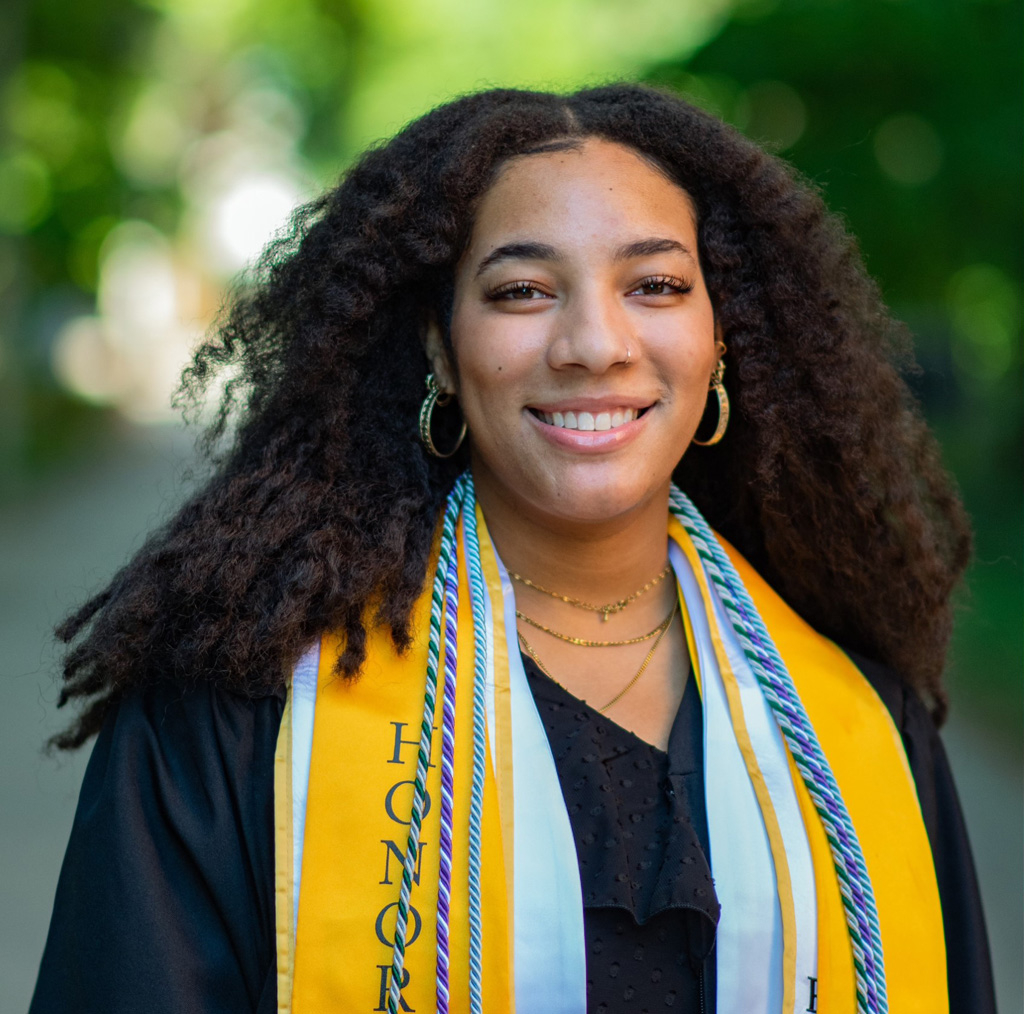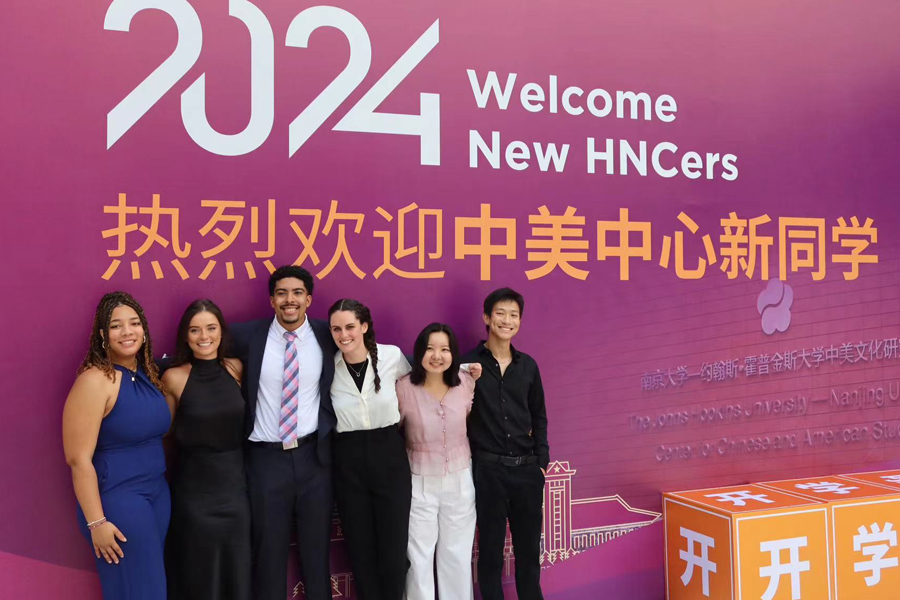Chinese Global Relations from a New Perspective

Name: Nailah-Benā Chambers
Home Country: USA
Degree: Undergraduate: Global Studies and Chinese Minor (Master of Arts in International Studies (MAIS) International Politics)
Tell us about your background, language learning process, and how you became interested in China.
At a young age I was enrolled in a culture/language Taiwanese school that was hosted every Sunday in my hometown of Richmond, Virginia. While this gave me an understanding of Mandarin Chinese on a colloquial level, I was missing a solid foundation surrounding writing, reading, etc. When I began college and chose my Chinese language minor, I built that foundation which led me to become increasingly interested in China and Taiwan relations. Having been solely introduced to Mandarin through a Taiwanese perspective, I was curious about their viewpoints and attitudes towards China and vice versa. I was extremely fortunate to have traveled to Taiwan and participated in a language program that enforced study habits and an ability to adapt to a new language environment, as well as solidified my understanding of Taiwanese global relations regarding China. Additionally, attending an intensive language program has ingrained study habits that are proving more than useful here at the Hopkins-Nanjing Center. I have found that implementing small but efficient habits such as music, television, and routine immersion will allow me to still maintain my understanding of the language even if my skill level is not increasing rapidly.
Before joining the Hopkins-Nanjing Center, what were you doing?
Before joining the HNC, I was in an English teaching assistantship with the Fulbright Program in Taichung, Taiwan. I was teaching at two schools, one of which allowed me to use my Mandarin Chinese frequently and helped me build new vocabulary. This experience was also a useful preparation for the HNC, as both programs introduced me to a new skillset and way of thinking different from any past experience. The adaptability, creativity, and patience needed to be an ESL teacher, especially abroad, is easily transferrable to the HNC and the way I approach my course work.
Be kind and understanding to yourself and be patient. You were admitted to the program because you can do it, and you will.
What led you to the Hopkins-Nanjing Center? What made you choose the HNC?
After graduating college, I had planned to complete my Fulbright and then search for work in the field of international relations or global development. However, I still felt unsatisfied with my Chinese level and wanted to increase not only my language ability, but also my understanding of Chinese global relations from a new perspective. The Hopkins-Nanjing Center combines the language immersion, perspective, and ability to live abroad in my target language environment.
How have you found the social scene at the HNC thus far? How do you feel about the community and making Chinese friends?
To be quite honest, I was a bit nervous about coming here. I had this pre-conceived notion that students here would be extremely focused on work and nothing else—after all, Johns Hopkins University has a reputation of being one of the top universities for international relations. However, every single person I have come across is outgoing, personable, and extremely interesting. Sometimes it is hard to believe that all of us ended up in the same building living and studying together when I hear about all the different walks of life and experiences my peers had before coming to HNC. I am so fortunate to be surrounded by such like-minded and driven people.
What is your rose, bud, and thorn about the program? The rose is something you are enjoying now, the bud is something you are excited for in the future, and the thorn is a challenge you have experienced.
Rose: I am enjoying meeting new people, learning new words, and hearing the perspectives of my Chinese professors. Bud: I am excited to see how I have improved language-wise and in my understanding of international relations. Thorn: A challenge I have experienced so far is adjusting to the immersion aspect of the program without the “language program” aspect. HNC is not a language program. It is pure immersion. This is a big adjustment coming from a language program myself, as any grammar patterns or words used in context that I do not understand will not be explained immediately to me. As a student at the HNC, you really have to build that skill of critical thinking and problem solving in real time while also staying on track with the class. However, this is a skill that I am beginning to enjoy. When I’m able to figure out context through reading or through active listening, I feel more engaged, and more prepared to tackle the next challenge that immersion will bring.
What do you plan on pursuing after graduation? Where do you see yourself 5-10 years after graduation?
I plan to move to Washington, D.C. and work in global development (private or NGO) and utilize my Chinese language in a large capacity. In 5-10 years, I see myself actively engaging in international relations, whether that be on a small or large scale, and still using Chinese daily.
How was your experience adjusting to the Chinese course work? Do you have any tips for future students?
Adjusting to the Chinese course work was hard and nerve-wracking. I spent all summer studying the HNC 100 words to know list and it did not fully prepare me for the first day of class and being shown 30 slides for an hour and a half with no translation or explanation outside of Chinese. There truly is no way to fully prepare for this program—every class, professor, and student is different, and every circumstance is unique. My first two days of classes were not terrible, but not great. I understood maybe 60-70 percent of what was said. However, four classes later, and I am following on at about an 80-85 percent comprehension rate. It takes time and can be a blow to your self-esteem. I would recommend putting in the hours studying and meeting with your professors during office hours. When they post the PowerPoints, I immediately make a word list of the common words I don’t know, and I study those first and foremost. Most of the issues with comprehension is vocabulary; how are you supposed to follow along if you don’t even know the words? I study the words and handwrite them down and then I go back and try to tackle the PowerPoint. I have also found that taking notes in Chinese during and after class helps a lot. Even if I don’t know the character or word during class, I will write the pinyin or English word instead. But I try as hard as I can to take fully Chinese notes and come up with questions in Chinese that I ask during office hours. This way I am only thinking in Chinese straight from the original text and can hear it spoken multiple times by the professor in office hours.
If you could give one piece of advice to future HNC students, what would that be?
Be kind and understanding to yourself and be patient. You were admitted to the program because you can do it, and you will. 加油!
If you are looking to learn more about what it's like to be a current student at Johns Hopkins SAIS, we encourage you to schedule a virtual appointment with one of our Admissions Fellows.
Enjoyed reading Nailah-Benā experience? Learn more about our Master of Arts in International Studies (MAIS).
Back to Student Stories